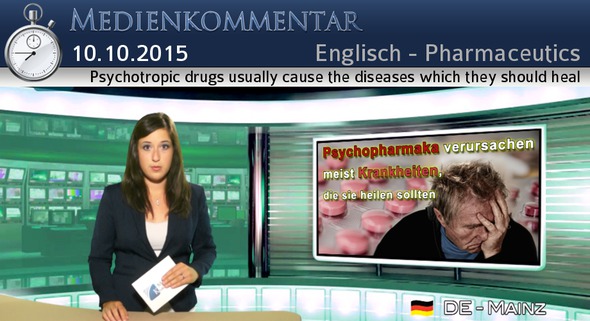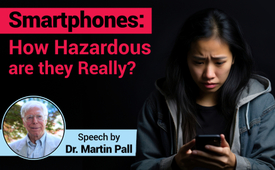Health & Medecine (English)
Psychotropic drugs usually cause the diseases they should heal
10.10.2015
Subtitle "Afrikaans" was produced by machine.Subtitle "አማርኛ" was produced by machine.Subtitle "العربية " was produced by machine.Subtitle "Ārāmāyâ" was produced by machine.Subtitle "azərbaycan dili " was produced by machine.Subtitle "беларуская мова " was produced by machine.Подзаглавието "България" е създадено от машина.সাবটাইটেল "বাংলা " মেশিন দ্বারা তৈরি করা হয়েছিল।Subtitle "བོད་ཡིག" was produced by machine.Subtitle "босански" was produced by machine.Subtitle "català" was produced by machine.Subtitle "Cebuano" was produced by machine.Subtitle "ગુજરાતી" was produced by machine.Subtitle "corsu" was produced by machine.Podtitul "Čeština" byl vytvořen automaticky.Subtitle "Cymraeg" was produced by machine.Subtitle "Dansk" was produced by machine.Untertitel "Deutsch" wurde maschinell erzeugt.Subtitle "Untertitel" was produced by machine.Ο υπότιτλος "Ελληνικά" δημιουργήθηκε αυτόματα.Subtitle "English" was produced by machine.Subtitle "Esperanto" was produced by machine.El subtítulo "Español" se generó automáticamente.Subtitle "Eesti" was produced by machine.Subtitle "euskara" was produced by machine.Subtitle "فارسی" was produced by machine.Subtitle "Suomi" was produced by machine.Le sous-titrage "Français" a été généré automatiquement.Subtitle "Frysk" was produced by machine.Subtitle "Gaeilge" was produced by machine.Subtitle "Gàidhlig" was produced by machine.Subtitle "Galego" was produced by machine.Subtitle "Schwizerdütsch" was produced by machine.Subtitle "هَوُسَ" was produced by machine.Subtitle "Ōlelo Hawaiʻi" was produced by machine.Subtitle "עברית" was produced by machine.Subtitle "हिन्दी" was produced by machine.Subtitle "Mẹo" was produced by machine.Subtitle "Hrvatski" was produced by machine.Subtitle "Kreyòl ayisyen " was produced by machine.Subtitle "Magyar" was produced by machine.Subtitle "Հայերեն" was produced by machine.Subtitle "Bahasa Indonesia " was produced by machine.Subtitle "Asụsụ Igbo " was produced by machine.Textun"Íslenska" var framkvæmt vélrænt.Sottotitoli "Italiano" sono stati generati automaticamente.字幕は"日本語" 自動的に生成されました。Subtitle "Basa Jawa" was produced by machine.Subtitle "ქართული" was produced by machine.Subtitle "қазақ тілі " was produced by machine.Subtitle "ភាសាខ្មែរ" was produced by machine.Subtitle "ಕನ್ನಡ" was produced by machine.Subtitle "한국어" was produced by machine.Subtitle "कोंकणी語" was produced by machine.Subtitle "کوردی" was produced by machine.Subtitle "Кыргызча" was produced by machine.Subtitle " lingua latina" was produced by machine.Subtitle "Lëtzebuergesch" was produced by machine.Subtitle "Lingala" was produced by machine.Subtitle "ພາສາ" was produced by machine.Subtitle "Lietuvių" was produced by machine.Subtitle "Latviešu" was produced by machine.Subtitle "fiteny malagasy" was produced by machine.Subtitle "te reo Māori" was produced by machine.Subtitle "македонски јазик" was produced by machine.Subtitle "malayāḷaṁ" was produced by machine.Subtitle "Монгол хэл" was produced by machine.Subtitle "मराठी" was produced by machine.Subtitle "Bahasa Malaysia" was produced by machine.Subtitle "Malti" was produced by machine.Subtitle "မြန်မာစာ " was produced by machine.Subtitle "नेपाली" was produced by machine.Ondertitels "Nederlands" machinaal geproduceerd.Subtitle "Norsk" was produced by machine.Subtitle "chiCheŵa" was produced by machine.Subtitle "ਪੰਜਾਬੀ" was produced by machine.Podtytuł "Polska" został utworzony przez maszynę.Subtitle "پښتو" was produced by machine.Legenda "Português" foi gerada automaticamente.Subtitle "Română" was produced by machine.Subtitle "Язык жестов (Русский)" was produced by machine.Субтитры "Pусский" были созданы машиной.Subtitle "Kinyarwanda" was produced by machine.Subtitle "सिन्धी" was produced by machine.Subtitle "Deutschschweizer Gebärdensprache" was produced by machine.Subtitle "සිංහල" was produced by machine.Subtitle "Slovensky" was produced by machine.Subtitle "Slovenski" was produced by machine.Subtitle "gagana fa'a Samoa" was produced by machine.Subtitle "chiShona" was produced by machine.Subtitle "Soomaaliga" was produced by machine.Titra "Shqip" u krijua automatikisht.Subtitle "србски" was produced by machine.Subtitle "Sesotho" was produced by machine.Subtitle "Basa Sunda" was produced by machine.Undertext "Svenska" är maskinell skapad.Subtitle "Kiswahili" was produced by machine.Subtitle "தமிழ்" was produced by machine.Subtitle "తెలుగు" was produced by machine.Subtitle "Тоҷикй" was produced by machine.Subtitle "ภาษาไทย" was produced by machine.ንኡስ ኣርእስቲ "ትግርኛ" ብማሽን እዩ ተፈሪዩ።Subtitle "Türkmençe" was produced by machine.Subtitle "Tagalog" ay nabuo sa pamamagitan ng makina.Altyazı "Türkçe" otomatik olarak oluşturuldu.Subtitle "татар теле" was produced by machine.Subtitle "Українська " was produced by machine.ذیلی عنوان "اردو" مشین کے ذریعہ تیار کیا گیا تھا۔Subtitle "Oʻzbek" was produced by machine.Phụ đề được tạo bởi máy.Subtitle "Serbšćina" was produced by machine.Subtitle "isiXhosa" was produced by machine.Subtitle "ייִדיש" was produced by machine.Subtitle "Yorùbá" was produced by machine.Subtitle "中文" was produced by machine.Subtitle "isiZulu" was produced by machine.
kla.TV accepts no liability for defective translation.kla.TV accepts no liability for defective translation.kla.TV accepts no liability for defective translation.kla.TV accepts no liability for defective translation.kla.TV accepts no liability for defective translation.kla.TV accepts no liability for defective translation.kla.TV не носи отговорност за некачествен превод.অপর্যাপ্ত অনুবাদের জন্য kla.TV কোন দায় বহন করে না।kla.TV accepts no liability for defective translation.kla.TV accepts no liability for defective translation.kla.TV accepts no liability for defective translation.kla.TV accepts no liability for defective translation.kla.TV accepts no liability for defective translation.kla.TV accepts no liability for defective translation.kla.TV nenese žádnou odpovědnost za chybné překlady.kla.TV accepts no liability for defective translation.kla.TV accepts no liability for defective translation.kla.TV übernimmt keine Haftung für mangelhafte Übersetzung.kla.TV accepts no liability for inadequate translationΗ kla.TV δεν φέρει καμία ευθύνη για ανεπαρκή μετάφραση.kla.TV accepts no liability for defective translation.kla.TV accepts no liability for defective translation.kla.TV no se hace responsable de traducciones incorrectas.kla.TV accepts no liability for defective translation.kla.TV accepts no liability for defective translation.kla.TV accepts no liability for defective translation.kla.TV accepts no liability for defective translation.kla.TV n'assume aucune responsabilité en cas de mauvaise traduction.kla.TV accepts no liability for defective translation.kla.TV accepts no liability for defective translation.kla.TV accepts no liability for defective translation.kla.TV accepts no liability for defective translation.kla.TV accepts no liability for defective translation.kla.TV accepts no liability for defective translation.kla.TV accepts no liability for defective translation.kla.TV accepts no liability for defective translation.kla.TV accepts no liability for defective translation.kla.TV accepts no liability for defective translation.kla.TV accepts no liability for defective translation.kla.TV accepts no liability for defective translation.kla.TV nem vállal felelősséget a hibás fordításértkla.TV accepts no liability for defective translation.kla.TV accepts no liability for defective translation.kla.TV accepts no liability for defective translation.kla.TV tekur enga ábyrgð á áræðanleika þýðingarinnarKla.TV non si assume alcuna responsabilità per traduzioni lacunose e/o errate.Kla.TV は、不適切な翻訳に対して一切の責任を負いません。kla.TV accepts no liability for defective translation.kla.TV accepts no liability for defective translation.kla.TV accepts no liability for defective translation.kla.TV accepts no liability for defective translation.kla.TV accepts no liability for defective translation.kla.TV accepts no liability for defective translation.kla.TV accepts no liability for defective translation.kla.TV accepts no liability for defective translation.kla.TV accepts no liability for defective translation.kla.TV accepts no liability for defective translation.kla.TV accepts no liability for defective translation.kla.TV accepts no liability for defective translation.kla.TV accepts no liability for defective translation.kla.TV accepts no liability for defective translation.kla.TV accepts no liability for defective translation.kla.TV accepts no liability for defective translation.kla.TV accepts no liability for defective translation.kla.TV accepts no liability for defective translation.kla.TV accepts no liability for defective translation.kla.TV accepts no liability for defective translation.kla.TV accepts no liability for defective translation.kla.TV accepts no liability for defective translation.kla.TV accepts no liability for defective translation.kla.TV accepts no liability for defective translation.kla.TV accepts no liability for defective translation.kla.TV aanvaardt geen aansprakelijkheid voor foutieve vertalingen.kla.TV accepts no liability for defective translation.kla.TV accepts no liability for defective translation.kla.TV accepts no liability for defective translation.kla.TV nie ponosi odpowiedzialności za wadliwe tłumaczenie.kla.TV accepts no liability for defective translation.kla.TV não se responsabiliza por traduções defeituosas.kla.TV accepts no liability for defective translation.kla.TV accepts no liability for defective translation.kla.TV не несет ответственности за некачественный перевод.kla.TV accepts no liability for defective translation.kla.TV accepts no liability for defective translation.kla.TV accepts no liability for defective translation.kla.TV accepts no liability for defective translation.kla.TV accepts no liability for defective translation.kla.TV accepts no liability for defective translation.kla.TV accepts no liability for defective translation.kla.TV accepts no liability for defective translation.kla.TV accepts no liability for defective translation.kla.TV nuk mban asnjë përgjegjësi për përkthime joadekuate.kla.TV accepts no liability for defective translation.kla.TV accepts no liability for defective translation.kla.TV accepts no liability for defective translation.Kla.TV tar inget ansvar för felaktiga översättningar.kla.TV accepts no liability for defective translation.kla.TV accepts no liability for defective translation.kla.TV accepts no liability for defective translation.kla.TV accepts no liability for defective translation.kla.TV accepts no liability for defective translation.kla.TV ንዝኾነ ጉድለት ትርጉም ዝኾነ ይኹን ሓላፍነት ኣይቅበልን እዩ።kla.TV accepts no liability for defective translation.kla. Walang pananagutan ang TV sa mga depektibong pagsasalin.kla.TV hatalı çeviriler için hiçbir sorumluluk kabul etmez.kla.TV accepts no liability for defective translation.kla.TV accepts no liability for defective translation.kla.TV عیب دار ترجمہ کے لیے کوئی ذمہ داری قبول نہیں کرتا ہے۔kla.TV accepts no liability for defective translation.Kla. TV không chịu trách nhiệm về bản dịch không đầy đủ.kla.TV accepts no liability for defective translation.kla.TV accepts no liability for defective translation.kla.TV accepts no liability for defective translation.kla.TV accepts no liability for defective translation.kla.TV accepts no liability for defective translation.kla.TV accepts no liability for defective translation.
kla.tv/6893

Popular 83.461 views
This is a modal window.
The media could not be loaded, either because the server or network failed or because the format is not supported.
Psychotropic drugs usually cause the diseases they should heal
10.10.2015
www.kla.tv/6893
In 2013 the 'Organization for Economic Cooperation and Development', OECD, published its annual report on the frequency of delivery of antidepressants, the drugs which are used to treat depression.
The use of antidepressants has risen dramatically in the past decade in most OECD countries. In some countries more than one out of ten adults is now prescribed an antidepressant.
[continue reading]
Psychotropic drugs usually cause the diseases they should heal
Download broadcast and attachments in the wanted quality:
83.461 views
Hashtags:
Useage rights:
Standard-Kla.TV-Licence
Psychotropic drugs usually cause the diseases ...
Psychotropic drugs can lead to violence and ...
Vigils for vaccine damages in Germany: Vaccine ...
Did Berlin infant really die of measles? ...
Is there any evidence of HIV? ...
Historical review: Mandatory vaccinations ...
Deadly medicine (Part 2) – Systemic error in ...
Deadly medicine – ignorance or premeditated ...
Africa - illnesses redefined as AIDS ...
Studies on the measles show: There is ...
Measles vaccination – useful or harmful? ...
Cancer disease - a business? ...
Vaccination project by the Bill Gates ...
World Diabetes Day - or: What are the goals of ...
Ebola-vaccine: purposeful gene-manipulation of ...
Ebola, BSE, bird-flu, swine-flu ...
Ebola-epidemic and the role of the WHO ...
Ebola virus - fact or fake? ...
Attacks against Ebola helpers - two ...
The Ebola race ...
Ebola criticism: when will Obama's army help ...
Ebola - the USA already have a patent ...
Should Ebola be declared a worldwide epidemic? ...
Manipulation of Opinion ...
Trending on Kla.TV











1
www.kla.tv/37542 1:40:01 Ritual Cults - Disclosed Actions Coming to Light (Walpurgis Night)

2
www.kla.tv/31816 1:29:49 RESONANCE Beings of Frequency Documentary film by James Russell on the Dangers of Wireless Technology

3
www.kla.tv/37632 16:46 The Great Reset Agenda – Economic Destruction and War

4
www.kla.tv/37526 11:36 The Risk of Caring - Interview with Paul Golden

5
www.kla.tv/23558 2:03:44 Against Racism and Conspiracy - by Ivo Sasek 2015

6
www.kla.tv/37533 28:20 Interview with Dr. Calin Georgescu The BIG „Change“ comes through the people

7
www.kla.tv/37476 47:38 Why haven't we been back to the moon? - Interview with Bart Sibrel

8
www.kla.tv/37686 6:13:06 „Unleash Unimagined Privileges!“ – Insights into International Friends Meeting 2025 (with Ivo Sasek)

9
www.kla.tv/37684 41:09 WHO Assembly 2025: What the WHO Pandemic Agreement REALLY is – Interview with James Roguski

10
www.kla.tv/30749 47:51 US-Special: THE TRUMP FILE – Savior or Part of the Deep State?





















 Deutsch-ID setzten
Deutsch-ID setzten



Sendungstext
herunterladen
10.10.2015 | www.kla.tv/6893
In 2013 the 'Organization for Economic Cooperation and Development', OECD, published its annual report on the frequency of delivery of antidepressants, the drugs which are used to treat depression. The use of antidepressants has risen dramatically in the past decade in most OECD countries. In some countries more than one out of ten adults is now prescribed an antidepressant. Iceland, Australia, and Canada are leading in this statistic. In 2011 in Iceland the prescribed daily dosage was around 100 per 1,000 inhabitants. In the year 2000 this figure had only been 70 daily doses per 1,000 inhabitants. Also in Germany the number of prescriptions has increased significantly: from only 20 daily doses per 1,000 inhabitants in 2000 to 50 daily doses per 1,000 inhabitants in 2011. The term 'Depression' describes a mental disorder with three main symptoms: gloomymood, loss of interest or sadness, and a lack of motivation or increased fatigability. How did it come about that mental illnesses, such as depression, were ever treated with drugs? Since the end of the 19th century psychiatrists have searched for ways to classify mental disorders. They documented their efforts in various editions of the "Diagnostic and Statistical Manual of Mental Disorders" (DSM). This was published for the first time in 1952 by the "American Psychiatric Association" (APA) the major U.S. professional organization of psychiatry. The description of mental disorders was not based on a scientific method, but on a written vote of ten percent of psychiatrists who were APA members. When drugs – such as the sedative Valium – came onto the market, the APA looked for a biological explanation for the prescription of drugs for mental disorders. The psychiatrist Dr. Joseph Schildkraut published the following theory in 1950. I quote: "Mental health problems may be due to a biochemical imbalance of neurotransmitters, which are messenger substances in the brain." But the theory of chemical imbalance with depression was refutedas early as in 1984. It was then that scientists were for the first time able to measure the cerebrospinal fluid of depressed patients. The serotonin value, a messenger substance in the brain, was sometimes high and sometimes low, regardless if the people were depressed or healthy. Further scientific studies confirmed this. A study was published in 1994 in the ‘Journal of American Medical Association‘, a medical journal. It showed that a reduction of serotonin in untreated depressed patients did not worsen the depression. In 2001 the 'British Journal of Psychiatry' published another study in which these experiments were repeated. There researchers measured the serotonin concentration in the brain. They proved that a serotonin-low nutrition lowers the serotonin concentration in the brain. However, this did not result in depression for healthy people. This means that there is no chemical imbalance of messenger substances in the brain while having a mental illness. Nevertheless, since about 1952 mentally ill patients have been regularly treated with drugs that modify the inner serotonin metabolism in the brain. But what damage are psychiatric drugs going to cause the brain? In 1996 Stephan Hymen, former director of the world's largest research center for mental disorders, published a study related to this in the "American Journal of Psychiatry". It showed: - Psychiatric medications produce disorders of the neurotransmitters, the messenger substances in the brain. - In response to this, the brain develops a series of adjustments in order to maintain its balance. - As a result – within a few weeks – the brain will no longer function in the way that it would normally. Thus, one must come to the conclusion that psychiatric drugs – at least in many cases – actually cause those diseases which they should heal. This has also been confirmed by other studies that compare the progress of the disease of mentally ill patients with and without drug therapy. In these comparisons it is noticeable that patients receiving regular medication relapse more often than those who were treated without medication. This is referred to as a 'revolving door syndrome'. The relapse rate increased with administration of drugs from 55% to 69%. In addition, these relapses were more severe than with those patients that had not taken the medication. What conclusion must be drawn from these facts? After years of research on this topic Peter Götzsche, a professor of clinical research design, and Robert Whitaker, an American journalist, summarize it as follows. 'Psychiatric drugs do not eliminate any chemical imbalance ... they cause it. If one takes them for longer than a few weeks they will cause the very disease that they should heal.Psychological disorders - that in earlier days hadoften just been temporary diseases– we have made to be chronic disorders by the medications we use.”
from ch.
https://www.youtube.com/watch?v=YfrE-o4TdDI
http://www.depression-heute.de/vorurteile.html?id=20
http://www.anti-zensur.info/azkmediacenter.php?mediacenter=conference&topic=6&id=40
Tödliche Medizin und organisierte Kriminalität, Buch von Peter C. Götzsche http://www.bgsp-ev.de/pdfs/Whitaker%20deutsch.pdf
http://www.ncbi.nlm.nih.gov/pubmed/7944875
http://bjp.rcpsych.org/content/178/5/399.full.pdf+html